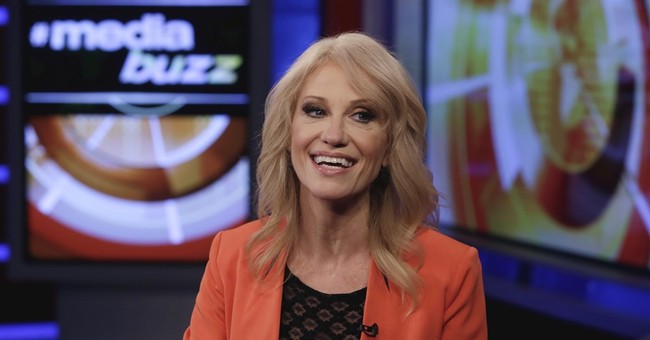Kellyanne Conway Lays Out the White House Agenda for 2018

Sounds good
During an appearance on Fox and Friends Tuesday morning, Special Counselor to the President Kellyanne Conway laid out the White House agenda for the next 30 days and 2018 overall, which includes a push for an infrastructure package, job growth, skills training, welfare reform, getting the border wall built and much more.
"This is a president who is invested in all types of careers and is trying to tell Americans that we dignify every type of work...not everybody is cut out for college and that's fine," Conway said. "We need to rebuild our nation's road and bridges and certainly our air-traffic control system."
As Conway discussed, President Trump will host Majority Leader Mitch McConnell and House Speaker Paul Ryan at Camp David this weekend to develop a reconciled agenda. Ryan has ambitious goals of entitlement reform and McConnell wants Dodd-Frank on the table for changes.
"America should look at this as a very positive development," she said, adding that the president wants Democrats to come to the table with ideas. "We hope they can come together for the good of the country."
SOURCE
***************************
Once again, Obamacare fails
Americans for Limited Government President Rick Manning today issued the following statement blasting the failure in New Mexico of another health care law co-op:
“New Mexico Health Connections was founded using $77 million of taxpayer loans. Now, they’re seeking private sector funding to keep them afloat at some level. Obamacare co-ops were supposed to be the non-profit approach to health insurance to make certain that everyone had low-cost options for coverage. Not surprisingly, co-ops across the nation have failed as customer costs exceeded revenues.
President Trump should demand that the New Mexico Health Connections the U.S. taxpayers at the front of the line for repaying the $77 million in loans they received. Naturally, these payments will never be received and the people who put their trust in a guaranteed to fail co-op business model will find in New Mexico as people have found in other states across the Union, that low-cost Obamacare was more hope than reality.”
SOURCE
****************************
Haley: We cut almost $300 million from UN budget
Retribution for an attempted rebuke from the General Assembly, or just good reform practice? After warning the United Nations that the US would “take names” of countries that voted for a resolution demanding that Donald Trump withdraw recognition of Jerusalem as Israel’s capital, ambassador Nikki Haley announced a $285 million cut to the UN’s operations budget. Haley cited the need to address “inefficiencies,” but the timing seems to send a message too:
The announcement didn’t make clear the entire amount of the budget or specify what effect the cut would have on the U.S. contribution.
U.S. ambassador to the U.N. Nikki Haley said that the “inefficiency and overspending” of the organization is well-known, and she would not let “the generosity of the American people be taken advantage of.”
She also said that while the mission was pleased with the results of budget negotiations, it would continue to “look at ways to increase the U.N.’s efficiency while protecting our interests.”
Note that this is not a cut in our contribution, but in the UN’s overall biennial spending in the 2018-19 budget. How much will that save the US? We are the largest contributor for UN operations; we supplied 22% of the previous biennial budget, and we’re probably still on the hook for a similar amount in this next budget. Assuming that percentage applies evenly to the savings, we cut our total outlay by $62.7 million.
To be sure, $285 million is a lot of money, but as with all such figures, context is necessary. The UN’s operating budget for the biennium ending now was $5.4 billion, approved exactly two years previous to this announcement. That budget trimmed off $100 million from the previous biennial budget, although then-Secretary General Ban Ki-moon complained that the issue was fewer resources, not an effort to reform the UN’s budget. “Funding continues to shrink,” Ban said at the time, “while demands on the United Nations grow.”
(Note, however, that peacekeeping functions and subsidiary UN agencies operate out of separate budgets funded mainly by voluntary donations from member nations.)
As a percentage of the overall budget, the cuts announced by Haley amount to just under 5.3%. That’s not insignificant — a 5.3% cut in real terms to the US federal budget would remove $217 billion in spending — but it’s not a crippling blow either. Plus, it seems very unlikely to have been part of a punishment for the General Assembly vote that took place last week, as budget negotiations would have been going on for months.
Still, this sends a message that the US will keep the pressure on the UN for real reform in its operations. Haley intends to get tough with the UN both on policy and “inefficiency and overspending,” which is a diplomatic manner of saying featherbedding and corruption. If the UN can’t do that on its own, the US intends to reduce the spoils possible and remove much of the incentive.
SOURCE
*****************************
Social Security Beneficiaries Hit Record 61,859,250
The number of Social Security beneficiaries hit a record 61,859,250 in November, according to data released by the Social Security Administration.
At the same time, according to the Bureau of Labor Statistics, with unemployment at the lowest rate since 2000 (4.1 percent), there were 126,827,000 full-time workers in the United States (including government workers). Yet that equaled only 2.05 full-time workers for each person receiving Social Security benefits.
Even when all 153,918,000 people who had jobs in November are considered (counting both full- and part-time workers), the ratio of workers to Social Security beneficiaries was about 2.49 to 1.
The record 61,859,250 Social Security beneficiaries in November, included 45,439,781 retired workers and their dependents; 5,992,862 survivors of deceased workers; and 10,426,607 disabled workers and their dependents.
The Social Security program has two primary elements: Old Age and Survivors Insurance and Disability Insurance. Each of these are supposed to be supported by a "payroll tax" imposed on a worker's earnings.
The payroll tax for the OASI is 10.03 percent and is split so that one half is deducted from a worker's paycheck and the other half is paid to the government by the employer. The payroll tax for DI is 2.37 percent and, like the OASI tax, is split between a deduction from a worker's paycheck and a payment made directly by the employer.
In total, the worker and employer must pay the government 12.4 percent in taxes (on the first $127,200 a worker makes) for the combined OASDI tax. Self-employed Americans pay the entire 12.4 percent directly.
But this is no longer enough, says the Social Security board of trustees, which includes the commissioner of Social Security and the secretaries of the Treasury, Labor and Health and Human Services.
In the past, when Social Security ran surpluses, the federal government loaned the surplus to itself so it could spend it immediately on other government programs.
In their 2017 report, the Social Security board of trustees puts it this way: "The Department of the Treasury invests trust fund reserves in interest-bearing securities issued by the U.S. Government."
Without the "interest" the government pays itself back on the money it has already spent from previous Social Security surpluses, the Social Security program would not have enough money now to pay all the current benefits it owes.
"The 2016 excess of total income over cost for the year was $35 billion," said the trustees' report. But "total income" — as the report calls it — includes the interest the government pays itself.
"However, when interest income is excluded," the report admitted, "Social Security's cost is projected to exceed its non-interest income throughout the projection period, as it has since 2010. For 2016, cost for the year exceeded non-interest income by $53 billion. For 2017, total income for the program is projected to exceed cost for the year by $59 billion, and non-interest income is projected to be $27 billion less than program cost for the year."
SOURCE
******************************
Nearly 25 Percent of DACA Illegal Aliens Are ‘Functionally Illiterate’ in English
Nearly 25 percent of illegal aliens eligible for former President Obama’s Deferred Action for Childhood Arrivals (DACA) program are “functionally illiterate” in the English language, a researcher says.
According to Center for Immigration Studies Director of Research Steven Camarota, about 24 percent of illegal aliens who are eligible for DACA — which President Trump administration will officially end in March 2018 — overstate their English proficiency skills and are “below basic” or “functionally illiterate.”
Additionally, the research found that about 46 percent of DACA illegal aliens only have “basic” English proficiency skills, despite narratives from corporate interests and the open borders lobby that recipients of the program are vastly highly-educated.
Camarota writes:
Even those numbers could exaggerate the level of assimilation. As mentioned above, a high-school diploma has become so commonplace among today’s youth (due in large part to watered-down standards) that it is no longer a strong indicator of skills. Similarly, CIS research has shown that immigrants tend to overstate their English ability.
When Hispanic immigrants, who make up some 80 to 90 percent of DACA recipients, recently took an objective test of English literacy, 44 percent of those who said they speak English “well” or “very well” actually scored “below basic” — a level sometimes described as functional illiteracy. Based on test-takers with the required age and residency, I estimate that perhaps 24 percent of the DACA-eligible population fall into the functionally illiterate category and another 46 percent have only “basic” English ability.
The research showing a lack of English proficiency among DACA illegal aliens comes as the Congressional Budget Office (CBO) released a report revealing that nearly 1 in 5 illegal aliens eligible for DACA would end up on food stamps within 10 years, Breitbart News reported.
The majority of DACA illegal aliens also live in low-income households, according to a study by Harvard scholar Roberto Gonzales outlined by the Center for Immigration Studies. That study found that 73 percent of illegal aliens covered by DACA are living in low-income households, qualifying for free lunch at American public high schools, as well as other federal welfare benefits, Breitbart News reported.
Also as Breitbart News reported, only four percent of DACA illegal aliens have completed a college education, making the DACA population far less likely than the native American population to finish college with a degree.
SOURCE
*************************************
For more blog postings from me, see TONGUE-TIED, EDUCATION WATCH INTERNATIONAL, GREENIE WATCH, POLITICAL CORRECTNESS WATCH, AUSTRALIAN POLITICS, and Paralipomena (Occasionally updated), a Coral reef compendium and an IQ compendium. (Both updated as news items come in). GUN WATCH is now mainly put together by Dean Weingarten. I also put up occasional updates on my Personal blog and each day I gather together my most substantial current writings on THE PSYCHOLOGIST.
Email me here (Hotmail address). My Home Pages are here (Academic) or here (Pictorial) or here (Personal)
***************************




